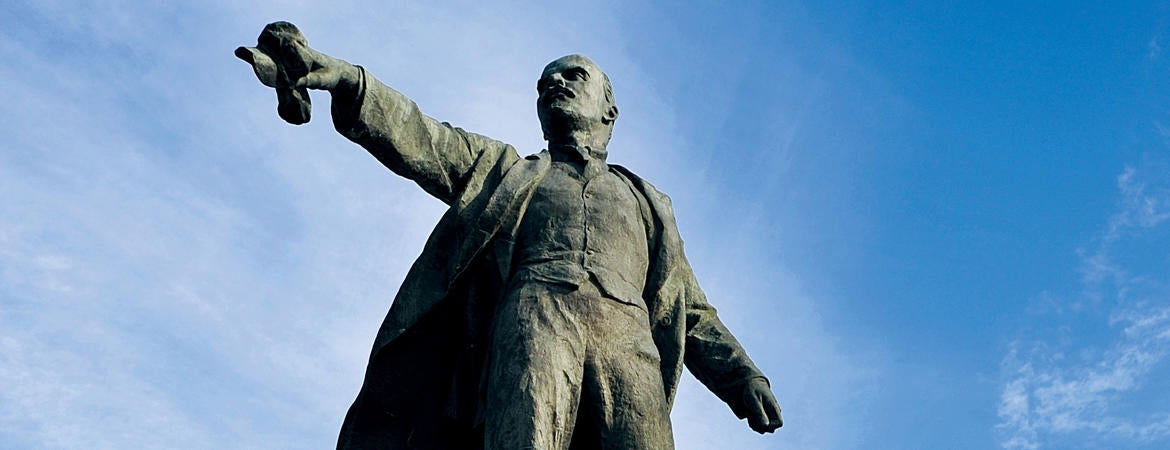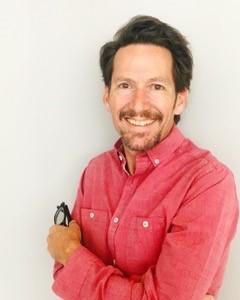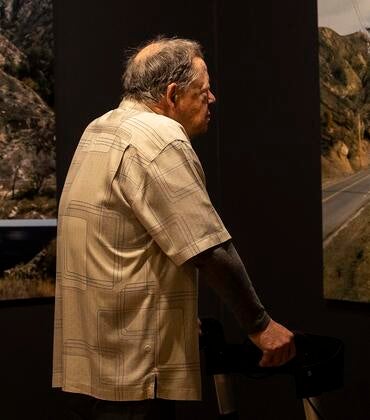
We asked UC Riverside Professor Paul D’Anieri to provide context on the Russian invasion of Ukraine. D’Anieri, a professor of political science and public policy, is an expert on Eastern European and post-Soviet politics, and wrote a 2019 book titled “Ukraine and Russia,” and a 2007 book, “Understanding Ukrainian Politics: Power, Politics and Institutional Design.” For the 2017-18 academic year, he served as a fellow in the Harvard University Ukrainian Research Institution.

Q: The crux of NATO’s present diplomatic tact is sanctions. Can you explain the reasoning behind this, and assess the likelihood of it working? What impact does the involvement of historically neutral Switzerland and its banking apparatus have on sanctions?
A: NATO’s strategy has expanded beyond sanctions. Several countries have announced that they will be sending weaponry to Ukraine. That is very significant. The sanctions that NATO and the European Union have enacted go well beyond what most people anticipated before the war. The West’s response focused on economic sanctions and supplying Ukraine because there is little appetite for putting their own soldiers in harm's way or to risk escalating the war. Economic sanctions are unlikely, in the short term, to compel Russia to withdraw, but the strength of the sanctions and the breadth of countries that have applied them show that the West has united, not divided, as many feared and as Putin undoubtedly hoped. The fact that historically neutral Switzerland is participating in economic sanctions shows the extent of outrage and signals Russia’s total isolation from the West. While the sanctions are unlikely to compel Putin, their immediate impact on the value of the Ruble means that Russian consumers will feel economic pain very soon.
Q: What sort of influence do Russian oligarchs yield in this conflict, and over Putin? Do the Russian oligarchs stand behind Putin now? Where did they stand before the invasion, where Putin’s stance toward Ukraine is concerned?
A: This question has generated a lot of discussion among scholars of Russia. One can only speculate on the extent to which Putin is constrained by the oligarchs. The oligarchs are heavily dependent on the system that Putin has created for their position—if the system collapses, they will likely lose their privileges. Moreover, they are hurt by the sanctions. So they may have some interest in urging Putin to change policy. Whether they can put any pressure on Putin is another matter. Paradoxically, the sanctions that freeze the assets of oligarchs may make them more dependent on Putin. Ultimately, it is the “siloviki” the people who control the coercive forces, such as the military, the security services (former KGB), and the Interior Ministry, who can either protect Putin or remove him. I do not anticipate that happening any time soon.
Q: What do you see as NATO’s next move?
A: Germany’s announcement that it will immediately increase its defense spending and will begin spending 2% of GDP signals a dramatic change in German policy. Putin has managed to get Germany to do something that the U.S. has been trying, unsuccessfully, to get Germany to do for four decades. As an alliance, NATO will continue to beef up its presence on its eastern flank, both to reassure the allies and to protect them from any possible attack by Russia. Lastly, we may see a discussion of admitting Sweden and Finland, two historically neutral countries.
Q: Has the U.S. and NATO response been appropriate thus far? Can you describe the line Biden and other NATO leaders are walking?
A: Yes. While NATO was divided prior to the invasion, the extent of Russia’s aggression has convinced even the hesitant states that Russia’s behavior was outrageous and had to be opposed. Again, Putin seems to have contributed to exactly the outcome he says he opposes. Italy, for example, dropped its opposition to excluding Russia from the SWIFT system. Moreover, several member states have announced plans to deliver weapons to Ukraine, and Germany has, after many years, agreed to meet the NATO standard of spending 2% of its GDP on defense. Biden’s patience regarding sanctions has paid off. Biden sought to ramp up sanctions rapidly, but until Russia invaded Ukraine, some of the Europeans were hesitant. By waiting, rather than pushing forward alone, Biden has managed both to keep the alliance unified and to obtain a strong set of sanctions. Overall, NATO is doing a great deal more than most anticipated, and is doing most of what Ukraine has requested.
Q: Ukraine’s president is asking NATO to enforce a no-fly zone over Ukraine. This would mean U.S. fighter jets engaging with Russia. NATO thus far is rejecting that tact.
A: Ukraine’s desire for a “no-fly” zone makes sense, because Ukraine is holding its own on the ground but is very vulnerable to Russian airpower. However, there is no way that NATO is going to have its air forces engage Russia directly. That could escalate to World War III. Instead, NATO has enacted close to the maximum of the contemplated sanctions and several members are arming Ukraine. If NATO members can rapidly supply Ukraine with anti-aircraft weapons, some of the effect of the no-fly zone might be achieved.
Q: What more could-should NATO be doing?
A: I am not sure that there is a lot that NATO should be doing that it is not. The key will be how quickly it can actually get arms to Ukraine and provide the necessary training to use them. A substantial deployment of anti-tank and anti-aircraft weapons would reduce Russia’s advantage in weaponry.
Q: Putin is deeply dissatisfied with the 1991 dissolution of the USSR that led to Ukraine’s independence and the diminishment of Russia as a world power. Is that what motivates Putin’s present actions? Is there more to it?
A: Much of the Russia elite, including Putin, rejected Ukraine’s independence from the very moment it happened back in 1991. That is the underlying cause of this trouble. Several events over the intervening three decades have served to increase Putin’s anger at Ukraine and at the West. These include policy over Yugoslavia, the U.S. invasion of Iraq, NATO expansion, and Ukraine’s overturning of authoritarian rulers in 2004 and 2014. Putin thought he would be able to bring Ukraine back under Russian control peacefully, as he has with Belarus. With that having failed, he is now resorting to force.
Q: What’s behind the deterioration of Russian-Ukrainian relations in the past 30 years
A: The root of the problem is that Russia does not accept Ukraine’s independence. The fact that Ukraine has turned toward Europe, while Putin’s embrace of authoritarianism has taken Russia away from Europe, makes the matter worse. Twice, in 2004 and after 2010, Russia thought it had put reliable pro-Russian leaders in place in Kyiv, and the fact that they were ejected through street protests angered Putin immensely. He not only sees this as illegitimate, but he fears the same thing happening in Russia. That is why he has repressed protests against him and increasingly cracked down on civil society.
Q: To what extent should this be considered a Russian initiative vs. a Putin initiative?
A: There is a lot of discussion on this question among specialists. My view is that Putin’s perspective on Ukraine and on NATO is widely shared among Russian elites and the Russian public. However, very few would actually wage war to win back Ukraine. The war must be attributed more directly to Putin.
Q: What is behind Putin's nuclear threats?
A: The goal is to deter the West from supporting Ukraine, and in particular from supplying it with weapons. The idea is to get us thinking that this could escalate to nuclear conflict, and therefore get us to hesitate in supporting Ukraine. My sense is that it’s unnecessary in the sense that the West is already aware of that danger and is being quite cautious, and is irresponsible in the sense that anything that moves closer to a nuclear strike increases the likelihood that it will happen accidentally.
Q: What is the posture of the Russian people?
A: The Russian people appear to have mixed opinions. While the seizure of Crimea was very popular, polls indicated less enthusiasm for the conflict in eastern Ukraine that also began in 2014. As is the case in most countries, we can expect a “rally around the flag” effect if Russia goes to war, but support can ebb quickly if war drags on and casualties mount. Over the longer term, the impact of sanctions may also undermine enthusiasm for the conflict.
Q: To what extent are the Russian peoples’ views on the Ukraine (and other matters) influenced by state-run media? Are they able to access alternate news sources in the internet age, in a way they couldn’t during the Cold War?
A: Putin has staged a massive propaganda blitz to convince Russians that their country is in danger and that attacking Ukraine is necessary and justified, but it is unclear to what extent people believe him at this point. Russians have some access to alternate opinions via the internet, but this is increasingly under control, and the TV stations through which most Russians get their news are all controlled by Putin and his allies.
Q: The Russians have a “false flag” strategy to defer blame to the Ukraine by making unsubstantiated assertions such as that the Ukraine is carrying out a genocide against Russian speakers. Is there a Russian or Soviet precedent for this strategy?
A: “False flag” operations, misinformation and disinformation are standard Soviet/Russian tactics that were honed during the Cold War and adopted seamlessly by post-Soviet Russia. Bogus claims have been made about Ukraine and its leadership for many years now. The strategy is aimed at Western media as well as at the Russian people. Very similar tactics were used to justify Russia’s invasion of Georgia in 2008, as well as its invasion of Ukraine in 2010. Some of Putin’s claims are laughable, but “the big lie” is a time-tested strategy.
Q: Do you have colleagues and friends in Ukraine? What is their state of mind?
A: I have a lot of friends and colleagues in Ukraine, and their uniform attitude is defiance. They are afraid of what is coming, but determined to resist come what may. Their messages to me have stressed that they will fight, but they need weapons to do so. Ukraine suffered immensely in the 20th century: World War I, famine, Stalinist repression and another famine that starved five million; Word War II, including occupation by Nazi Germany and the Holocaust; and then reoccupation by the Soviet Union. Ukrainians have endured incredible violence at the hands of outsiders, and their resilience has been, in my opinion, astonishing.
Q: Are other former Soviet republics in Putin’s sights next?
A: One consequence of the war is that Belarus is now firmly under Russia’s control. For many years, it had struck a more conciliatory posture, but still rejected integration with Russia. That is now over. Many of the Russian troops in Belarus will remain indefinitely, and the country will increasingly be ruled, de facto, from Moscow. Equally worrying is that Putin’s Feb. 21 speech referred quite explicitly to restoring not the Soviet Union, which he criticized in various ways, but the Russian empire as it existed prior to 1917. That not only calls into question all of the former Soviet states, but also a large part of Poland, including Warsaw, which was part of the Russian empire. How far he intends to go is unknown, and may depend on how things go in Ukraine. But after this week’s events, Russia’s neighbors cannot simply assume that they won’t be targeted.



